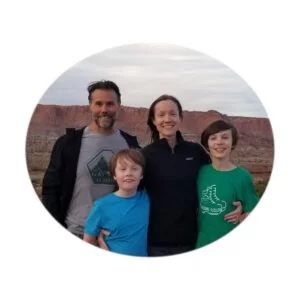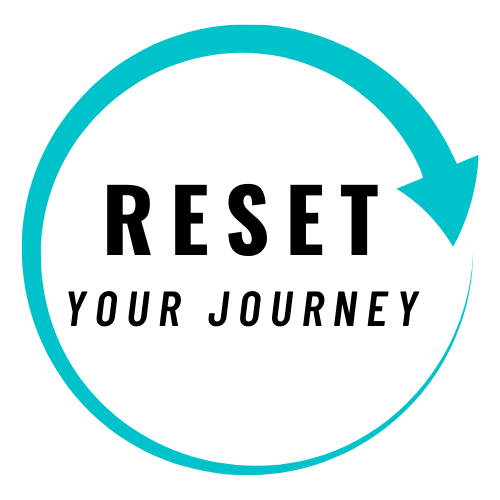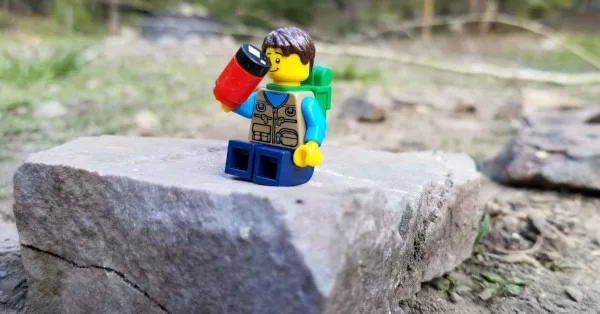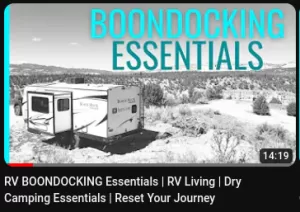Last Updated on 04/25/2024 by Glynn Willard
Is It Difficult To Live Full-Time In An RV?
There are several difficulties, some unique to each individual’s situation, some more general.
But there’s more to the RV lifestyle than just a tiny home with solar panels and traveling the open road.
The real growth and experience comes from stepping out of your comfort zone.
Seriously, full-time RVing is a lot more complicated than the full-time YouTube and social media celebrities make it look.
I’m not suggesting it’s impossible. But it requires a great deal of ongoing planning.
Even if you already own a recreational vehicle, the skill sets required for full-time are different than just taking a road trip in an RV
We were beginners at one point, so I can certainly give some insight about RV living for beginners as well as some insight on things to know before becoming full-time RVers.
Let’s count down the most difficult parts of becoming a full-time RVer to give you some insight on how to prepare for the full-time RV life.
As well as give you some things to know before full-time RVing.
Here’s a list of nine struggles we’ve overcome (or still deal with) that apply to a travel trailer, camper van or living in a motorhome.
- The Emotional Struggle Of Full Time RV Living
- Were we doing the right thing?
- Was this the best way to start a new chapter?
- How would we handle difficult times?
- Was every family member really on board?
- Should we turn around and run toward the safety of a traditional home?
- Dealing With A New Grocery Store Every Few Weeks
- Preparing Your Finances
- Are you disciplined enough to stay within budget?
- Are you disciplined in setting a budget?
- Downsizing Your Life Before Full Time RV Living
- Avoiding Over Packing The Rig
- Living In A Small Space
- Staying In An Area You’re Not Fond Of
- Parting With So Much Cash For Fuel
- You’ll Get Lonely
- Setting Your Itinerary When You’re Living Full Time In An RV
- Boondocking sites (options A, B & C)
- Inexpensive campgrounds of any type with availability if no boondocking locations are suitable.
- Potable water
- Dump Stations
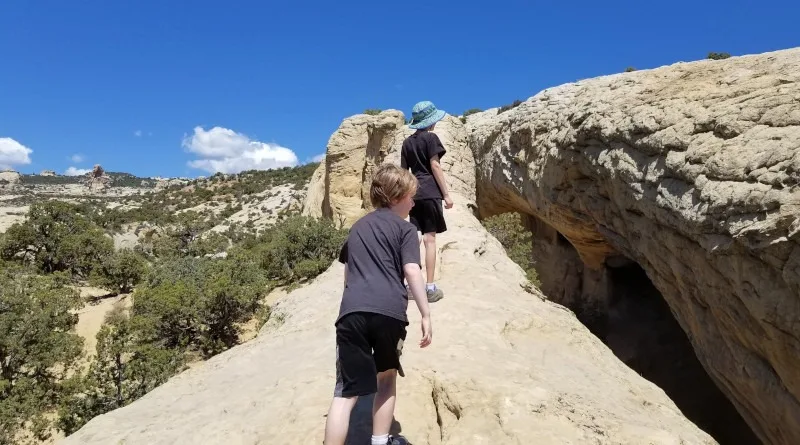
Moonshine Arch is a great hike near Vernal, UT dispersed camping.
A great friend of ours did a similar short-term trip. And she and her (at the time) boyfriend said there were a few hours of silence right after they left.
Well, sure enough, it was an awkward silence when we first left. In fact, I was a little sad.
Not a chance! We didn’t become successful in our other business by running toward safety. We embraced the challenge and overcame adversity in a big way.
And so we shall do the same for this adventure!
Now with that said. There are some difficult aspects to overcome. We’re a family of four full-time RV living in a very small space.
In fact, our living space is less than eight feet wide and twenty-three feet long. That’s small.
In addition, there was a forty-gallon terrarium with our bearded dragon Max, in the only floor space we have.
Let’s just say that we spend a lot of time outside.
Sometimes emotions run high, but then we look outside at the new place we’re in (a lake, the mountains or a beautiful pine forest).
So, yeah, there’s some turbulence. But there are a lot of different ways to overcome that turbulence.
Do we miss our friends? You bet we do!
But we speak to them a lot. And they love watching our YouTube channel.
So, if you’re concerned about the emotional struggle of full time RVing or van life, it’s not as bad as it may seem.
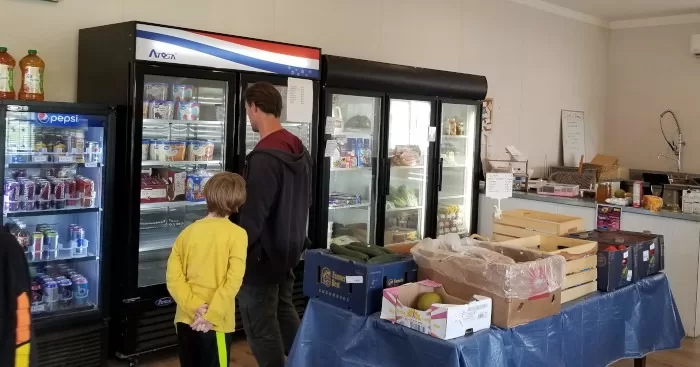
Sometimes you have to make due with a very small grocery store!
I used to enjoy grocery shopping… a lot! It was my sacred time to myself and to socialize with the staff and the regulars.
My formal education is in nutritional physiology. You can read that as the chemistry/physiology of nutrition. So, food and metabolism are my things.
Shameless plug time! You can follow my blog, gymfailedyou.com to learn more about fitness and nutrition. Anyway, back to grocery stores.
Going with a well-prepared list to any grocery store where you don’t know the layout is annoying. Now, do that every week.
It gets old, but I’m getting good at asking where everything is each time.
Asking is a real time saver. Get used to it for everything.
On a positive note, if you’re looking to increase “your step count,” you’ll accomplish it by circling the grocery store many times.

Prepare your budget early.
It’s not impossible, but wrapping up debt, saving and setting a budget is a good idea early in the process.
You can read more about the finance aspect in my article How We Prepared Our Finances For Full-Time RV Living.
I’ve encountered several full-timers who still carry a lot of debt. I can’t imagine living this lifestyle and being obligated to pay a lot every month.
If you’re fortunate to have one of the great remote jobs, this may not be as big a concern.
Regardless, being debt-free while living on the road is a great way!
I am advocating for you to pay down as much debt as possible before changing your path in life.
Finances are one of the few things that can cripple anyone and everyone. Get it under control!
We spent seven months living with my parents to wrap up our last bit of debt before resetting our journey. It was essential for us.
But it also turned out to be really rewarding!
You can make full-time RV living as inexpensive or expensive as you like. But it really does require discipline.
These are very important questions. My key point here is that you have to have a real financial plan before setting out full-time in an RV.
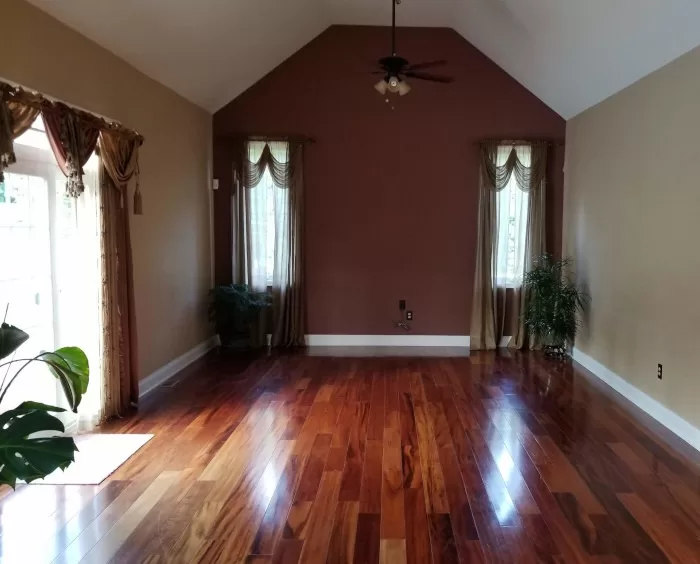
The last of our downsizing before selling the house.
I believe we were a little too cavalier about this once we made the decision.
It’s easy to say, “we’re six months out from selling, I’ll just do a little bit of sorting.” That’s a mistake.
Attack as much as possible daily and as early as possible while you’re still in your full-time residence. Waiting until the last minute equates to rash decisions.
There’s something liberating about seeing progress daily as your house grows more and more empty.
It also makes it easier to sell a lot of things by starting early. Used stuff doesn’t sell overnight. It needs time.
Let me say that again. You’ll need as much time as possible to sell a lot of your stuff. Start early!
I don’t think finding time to go through your things is the biggest issue. I believe it’s deciding what to keep, what to store and what to sell.
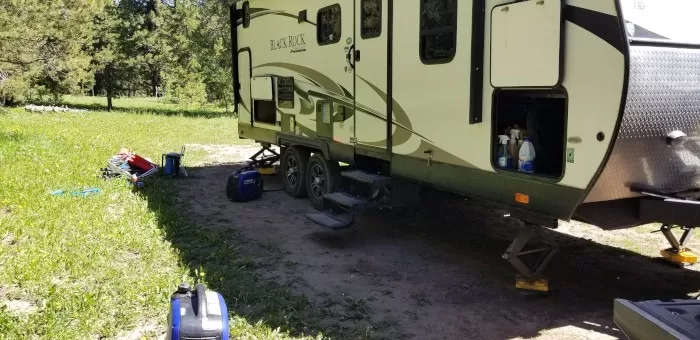
Unpacking the storage for clean out.
Okay, this is a big one! It’s so easy to say, “just in case we need it.” I now despise that saying!
It encourages over-packing. I’m a Boy Scout and I’m always prepared. But I’ve learned the hard way to stop packing the “just in case” stuff.
Just because you have several storage spaces for extra stuff, doesn’t mean you need to bring it all.
So far, I’ve found a Walmart on a corner of every town. I’m not a fan of the store, but they have what you need if you can’t find it locally.
You can usually fit your rig in their parking lot to pick up groceries on moving days.
I still ask locals where they shop for certain necessities before going to Walmart.
Nonetheless, the point is to pack less and figure out what you really need before packing the kitchen sink.
And we’ve even ordered from Amazon while at state parks. So, wait until you’re on the road.
You’ll appreciate the savings on fuel from not carrying nonessential stuff.
Also, exceeding your cargo-carrying capacity is dangerous, increases the wear and tear on your wheels and raises the potential cost of your RV maintenance.
I can’t emphasize this enough. Please, don’t overpack!!!!
Not Sure What You Need For Your RV?
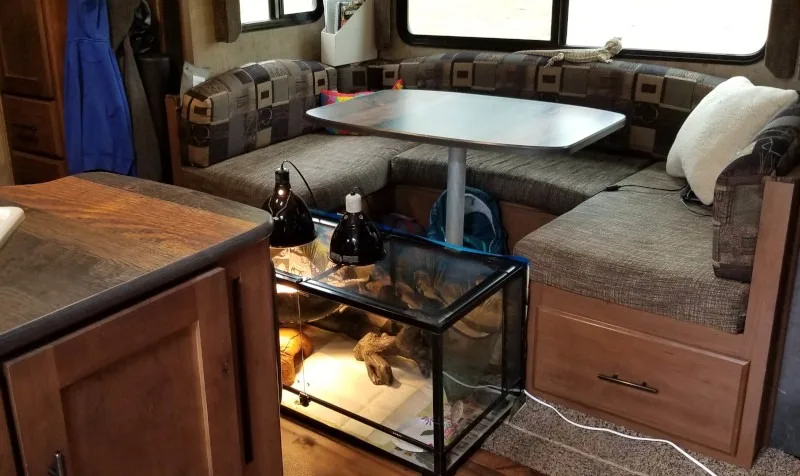
Max’s cage stayed close to the family.
This is something that ranks highly on the “difficulty scale.” This is also more subjective since we all feel differently about our personal space.
And your rig may be bigger than our small Outdoors RV 23BKS. Nonetheless, the saving grace is our ability to turn the outside space into our personal living space.
Put the large outdoor mat out, put the awning out and strategically place a few chairs and viola, a bigger space!
This does not apply if it’s bad weather.
Over time, we’ve learned to manage our small space very well. But, sometimes it would still be nice to escape to an empty part of the house.
But there are several positives that the trade-off creates. As I currently write this, I’m looking directly at a lake surrounded by pine trees.
The boys are riding their bikes and the awning has me shaded.
I can think of a lot worse places to do my work!
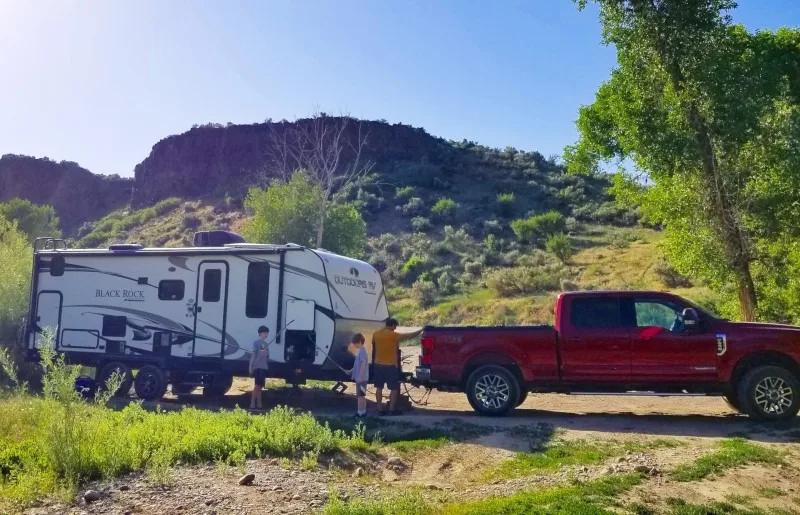
It may look nice, but it wasn’t great.
When most consider full-time RV living, they likely picture themselves in picturesque settings.
That’s not the norm. Especially when you’re trying to cover a lot of ground quickly.
If you use RV parks and consider booking one for a rest week in a popular area, it may not turn out as expected.
I’ve seen some ugly RV parks in popular destination towns.
Or you could book a “rest week” in an area that turns out to have nothing to do. I suppose that has its benefits if you just want to get work done.
But it does get old after a while. We use those occasions to get as much work done as possible.
The least productive locations happen to have nothing to do as well as no cell signal.
If you decide to live like us and boondock on public land most of the time, there can still be difficulties.
Not every boondocking location is the perfect place. Some are downright ugly or inhabited by individuals you may not want to camp near.
The beauty of this situation is you can move whenever you like when you’re boondocking.
The bottom line, you learn to make the best of it under any circumstance.
Adaptation is the name of the game. If I may use a common cliché.
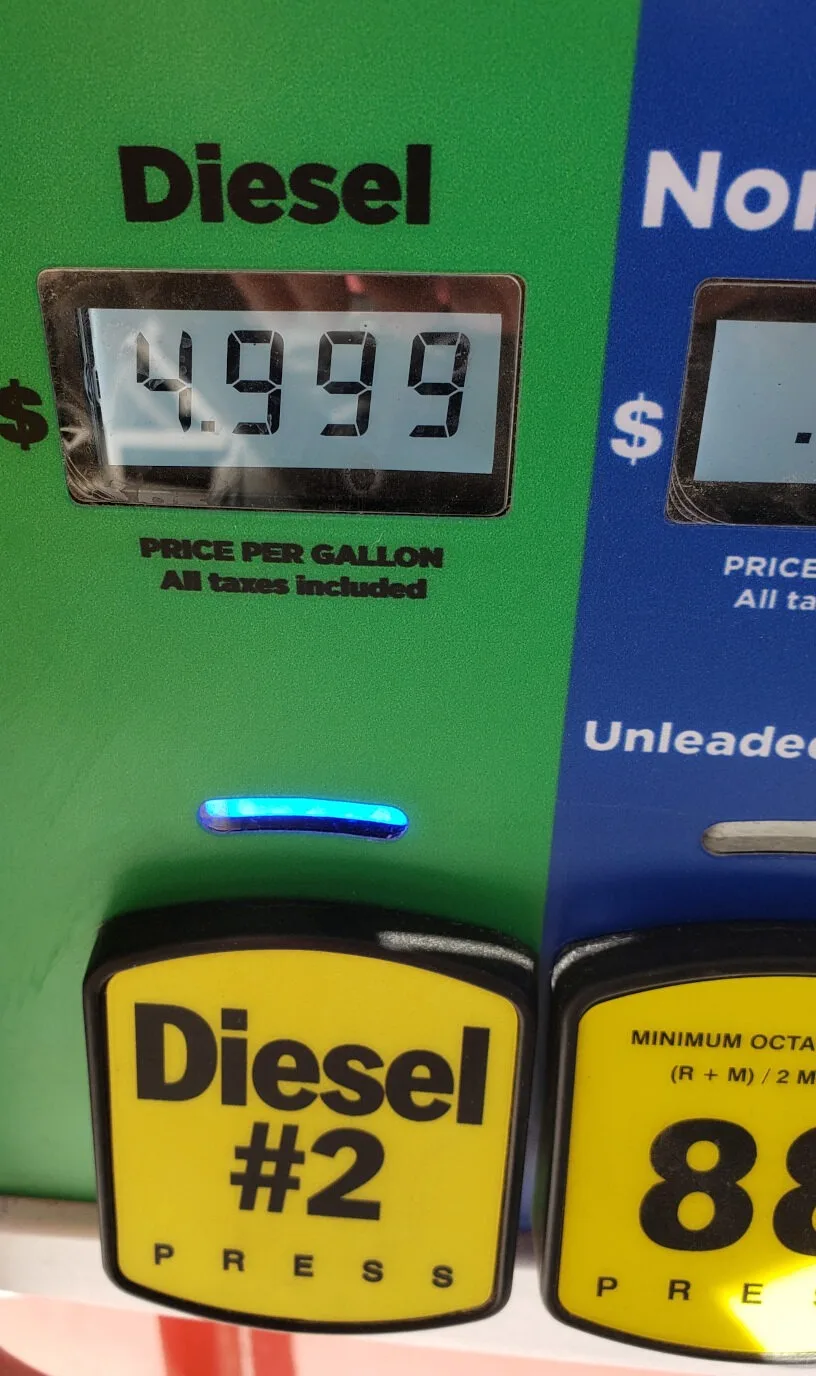
Ouch!
It doesn’t matter what you have. If it’s an RV, it gets very poor fuel economy compared to a family sedan.
I consistently get 11-12 miles to the gallon of diesel when towing. And that’s actually good.
Sometimes you have to fill up twice in one day when you’re moving a long distance. Zip… there goes a hundred-thirty dollars!
It gets old fast!
But there’s no way around it when you’re full-timing. If you remain stationary for longer periods, you save on fuel. This is to state the obvious of course.
But we grow tired of the same area after a week to ten days and want to keep exploring. So, we accept that our fuel bill will be higher than normal.
At least we save a lot of money by boondocking the majority of the time.
I’ve tracked every fill-up in my 2017 F250 since starting. It’s a painful spreadsheet!
If you know your timeline and itinerary, it’s easy to calculate how much you’ll spend on fuel.
But whatever that calculation is, add ten percent. We always use more than we think.
The bottom line is that you’ll need to come to terms with the phrase, “pain at the pump.”
Oh, and I want to make this important point about fuel costs and discounts. The discount plans are for the big truck stops.
They always charge a lot more for diesel than fuel stations further off the highway.
So, if you’re small and agile (we’re fifty feet total), drive less than a mile from the highway and find a fuel station that costs significantly less.
It’s worth it! And it’s rarely out of the way.
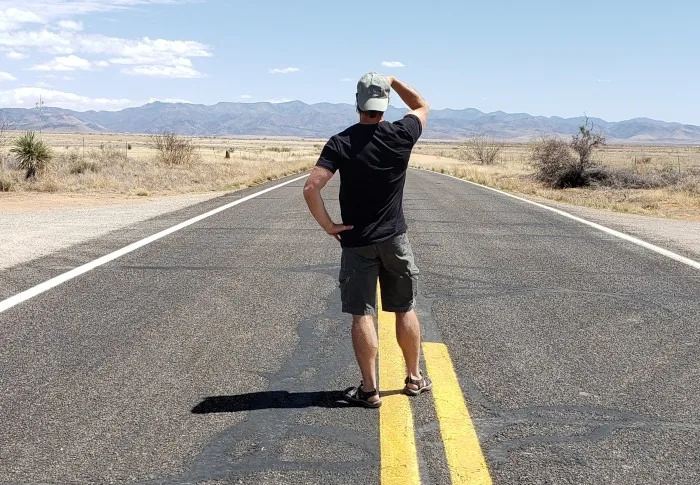
Even when you’re with your family, it can get lonely.
Especially when you boondock in remote locations.
It’s nice to call and text your friends and extended family, but after a while not seeing them in person gets difficult.
We solved this problem by meeting new people, making a lot of new friends and moochdocking with our friends around the country.
This is an aspect most full-timers are acutely aware of after about a year on the road.
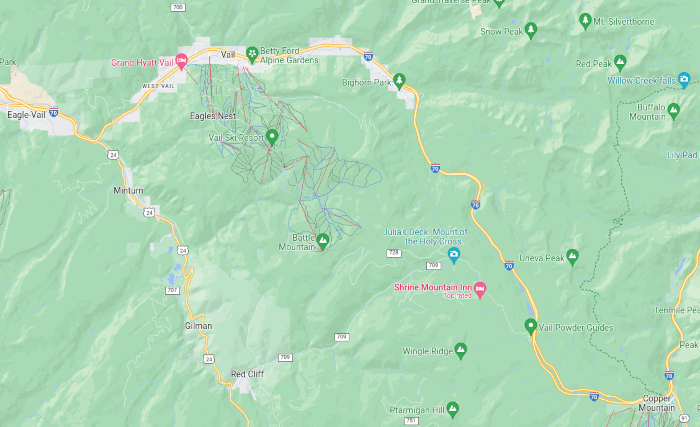
Since 2020, RVing has become very popular.
This translates into packed campgrounds in national parks, state parks, private campgrounds and popular boondocking locations.
It’s great for business, but it makes it super difficult to plan an itinerary last minute if it’s remotely close to cool attractions.
I’ve now found that I have to base my trajectory on what’s available with the following aspects (in no particular order):
Whenever we have WiFi or a strong cell signal, I’m up before the family plotting our itinerary.
I start with the direction, then the general area and finally base it on what’s available.
It’s not always the perfect scenario, but there are two things we all keep in mind. First, it’s all new and exciting to us!
And secondly, we’re all growing together as a family. That in itself, makes full timing worth all the effort.
The Most Important Aspect Of Full-Time Living In An RV
Most importantly, you have to have a strong financial plan. Period!
If your finances are not in order, full timing will only do more damage.
So please, plan accordingly.
You can read more about how we prepared our finances in our article How We Prepared Our Finances For Full Time RV Living.
The most difficult aspect of full-timing so far may be planning the itinerary, but finances are the most important!
Do We Have Any Full-Time RV Regrets so far?
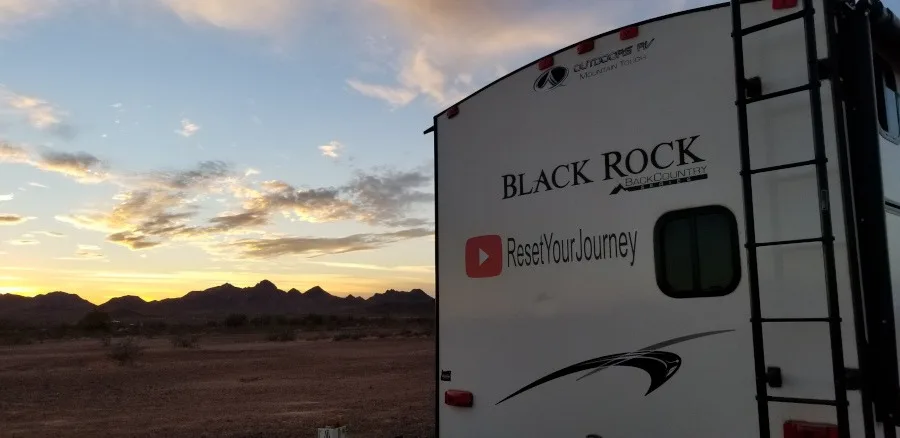
No way! Not a chance! I can honestly say, THIS IS THE BEST DECISION WE’VE MADE IN A LONG TIME!
For you, all of those “newbie” issues will soon become skill sets. You’ll have them system-based before you know it and be able to focus more on the best parts of full timing.
To help smooth the transition, we offer coaching to prepare for your fulltime RV transition.
If you’ve thought about full timing, what’s your biggest concern or fear?
Meet the author.
We appreciate any help we can get to bring you great content. Donate or buy us a coffee on our Ko-Fi site.
